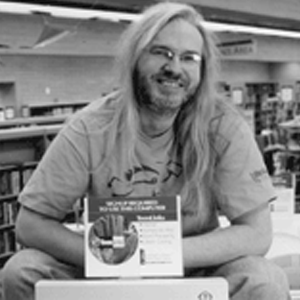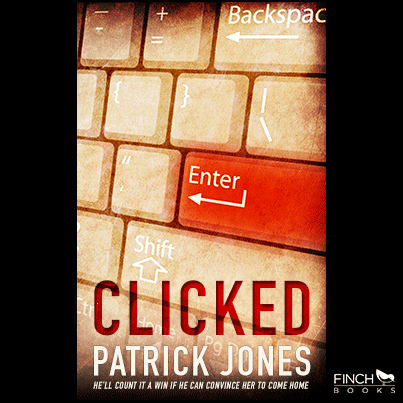
Posted by Charlotte Kirton on 12th February 2016

The most important fact of my life is that I grew up in Flint, Michigan. If you’re following news in the US in winter 2016 Flint is in the news as the state of Michigan made decisions to save money which resulted in poisoning the citizens of Flint with high levels of lead in the water. It is also a city that for years (and years) was the number one city, per capita, in violent crime and unemployment. I call Flint the land of opportunity as at the first opportunity I got the hell out of there. Since leaving Flint, I’ve worked mainly in libraries with teenagers, many of them “at risk” (in juvenile correctional facilities or alternative schools). I’m interested in telling stories about teens who don’t get their stories told by mainstream writers. I like stories where happy endings (see Flint reference) are the surprise, yet still there’s hope for better days. That’s a lot of what Clicked is about of finding yourself staring into an abyss and clawing your way out.
Clicked presents the best chance for a book of mine to be banned. I’ve been uninvited to schools because a parent or teacher found something objectionable (good, teen book should be objectionable to adults or they are not teen books), but never the outright ban. I’m guessing this trip into a teen world involving pornography, as well as (spoiler) an abortion, might do the trick.
Titles come very early in the writing process: Clicked I knew from almost the first few chapters. The kicker in the first real-time scene ends with the click of the mouse. The first flashback concludes with the click of a pistol trigger. During the book, things that click (or people who form cliques) get special attention. The names here are tricky because of the unique stories within the story structure so most characters have two names. This symbolizes how most teens live two lives: the life they have and the life they desire. Everything important should reveal character, push the plot, and deepen the theme. The main character is Carson, the son of an auto worker, and it is him figuring out his role as a son / brother / man that propels the novel.
It is a tough market out there, but you can make it. That is also one of the themes of Clicked that no matter what you do and where you do it there is almost always going to be someone better or more successful or more acclaimed than you. The value of writing comes from within, not from outside. I hang out with lots of writers in Minneapolis and we’re all over the place: some of us have day jobs and write when we can; some have MFAs and teach in MFA programs, and some had “it” from day one and have made a fine life writing / speaking without punching a timeclock. In 2010 I thought my career was finished after six novels. Since then, I’ve published – or have in production to publisher – thirty two novels, and four non-fiction books.

Other than killing Hitler, Stalin, and Pol Pot? Buying Amazon, Apple or Microsoft at a low price? I’d go back to myself at fourteen and tell myself to relax; that small mistakes and missteps are not the end of the world. That’s another theme in Clicked: within failure one can still find success.
It depends on the time of year: if it was the few weeks when Hatch green chiles are in season, then I’d be in New Mexico. In the summer, I’d like to be in Maine eating lobster. Wait, you said writing, not eating? Hmm, still the same but with lots of napkins so as to not get my keyboard sticky.
I have a book I wrote a few years ago while in a MFA program that deals with the three things in the US you never ever talk about directly in a teen book: race, religion, and politics, so it (Control Group: a fair and balanced novel) does all three. plus tackles issues like standardizing testing. I need to rewrite as there are references to people which need to be deleted. Or maybe something else will come along that sparks my interest instead. I’m happy Clicked (aka the porn book) found good home at Finch and maybe my keyboard will click another book this way.
Clicked blurb:
Three years ago, Carson’s sister ran away. Now he’s found her—on a porn site.
High-school senior Carson Banks is trying to find out what he wants to do with his life, wanting to move forward, though a part of him is firmly rooted in the day his life changed forever. The day his older sister Caitlin ran away, and disappeared without a trace. Then, he finds her—on an Internet porn site.
Deciding that finding Caitlin and bringing her home is the only thing he can do, Carson embarks on a quest that ends up changing him as much as Caitlin seems to have changed herself. Coping with the knowledge that he can’t share with the rest of his family—yet—Carson writes thinly veiled autobiographical stories to help himself better understand Caitlin and why she left home.
And, while using every opportunity he has to find Caitlin and talk to her, Carson’s typical teenage life goes on. Girlfriend. Family. School. Friends. Things he did in the past that he’s not too proud of. It’s a busy senior year, but he’ll count it a win—if he can locate her, learn exactly what happened on the day she left and convince Caitlin to come home.
Reader Advisory: This book contains scenes of male/female intimacy and non-graphic sexual situations. This book also contains references to teen pregnancy, content about or related to online pornography, the pornography industry, stripping and gun violence.
About Patrick Jones:
Born in same hometown as Michael Moore, Christopher Paul Curtis and Jon Sczieska (Flint, Michigan), Jones started his writing career at age eight with an article for a New York City-based pro wrestling newsletter. Since that time he has published over two hundred book reviews, one hundred plus articles, fifty or so essays in reference works, nine professional books for teachers and librarians, seven young adult novels and two nonfiction books. His current focus is reluctant YA readers, with twenty titles published since 2013, four due in fall 2015 and another four in spring 2016. In spring 2016, he will also publish a nonfiction book for teens on the changing nature of teen incarceration.
Patrick teaches an online Young Adult Literature class at Metro State University in St Paul, MN. Assignments in this class are due on Tuesday mornings so he can watch professional wrestling on Monday nights. Some things change, some don’t.